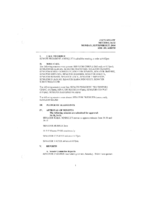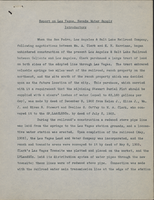Search the Special Collections and Archives Portal
Search Results

Transcript of interview with Eugene Brandise by Mark Mangiaracina, March 3, 1980
Date
Archival Collection
Description
Text

Meeting minutes for Consolidated Student Senate, University of Nevada, Las Vegas, September 27, 2004
Date
Archival Collection
Description
Text

Report on the water supply in Las Vegas, March 25, 1942
Date
Archival Collection
Description
Brief history of water in Las Vegas and overview of the water situation
Text

Transcript of interview with Ronald Bananto by Eric Henninger, March 15, 1981
Date
Archival Collection
Description
Text

Transcript of interview with Don Hayden by Steven Cohen, March 1, 1979
Date
Description
On March 1, 1979, collector Steven Cohen interviewed school administrator, Don Hayden (born in Ogden, Utah) in his home in Las Vegas, Nevada. This interview offers a historical overview of the education system in Nevada. Don also discusses gambling, the early atomic tests, the first hospitals built in Las Vegas, and offers his own personal account on home and family life in Nevada.
Text

Transcript of interview with John Erb by Susan Korzennik, February 23, 1980
Date
Archival Collection
Description
On February 23, 1980, Susan Korzennik interviewed construction worker John Erb (born on July 16th, 1932 in Denver, Colorado) in his home in Las Vegas, Nevada. This interview covers John’s construction work in the Las Vegas area in addition to family life in Nevada and local social, religious, and community activities. He also discusses being a member of the Elks Club and the Clark County Gentlemen’s Club.
Text

Interview with William Gus Flangas, November 12, 2004
Date
Archival Collection
Description
Text

Interview with Charles Costa, February 13, 2009
Date
Archival Collection
Description
Text

William McLeod interview, March 16, 1978: transcript
Date
Archival Collection
Description
On March 16, 1978, Valerie McLeod interviewed her father William Lee McLeod (b. January 31st, 1937 in Los Angeles, California) about his life in Las Vegas, Nevada. McLeod begins by speaking about his career as a contractor, the growth of Las Vegas and the city’s population. Moreover, he speaks about recreational activities such as riding motorcycles and exploring mines around Nevada. McLeod also spends time going over Indian reservations around Nevada and neighboring states, the Lost City in Nevada, boomtowns and ghost towns. Lastly, McLeod talks about the history of water and springs in the state of Nevada, what he would consider to be the Old Ranch and the stagecoaches that passed through Gold Point, Nevada.
Text

Nanyu Tomiyasu interview, April 12, 1977: transcript
Date
Archival Collection
Description
On April 12, 1977, collector Mark French interviewed Nanyu Tomiyasu (born May 28th, 1918 in Las Vegas, Nevada) at the University of Nevada, Las Vegas. In this interview, Nanyu Tomiyasu discusses growing up and working on his father’s (Bill Yonema Tomiyasu) farm in Las Vegas, Nevada. He also discusses how his father came to Las Vegas and being one of the few Japanese families in Las Vegas as a child.
Text
